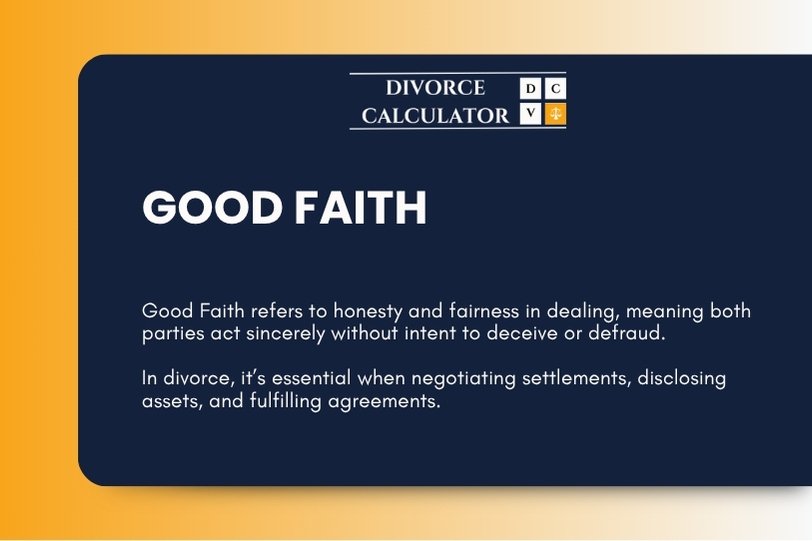Good faith is the expectation that all parties act honestly and fairly, without deception or hidden motives. This concept is fundamental in law, business, and everyday interactions, setting the standard for how we collaborate and resolve disputes.
When we act in good faith, we build trust and create an environment where agreements can hold real value. It affects contracts, negotiations, and even the simplest verbal promises, ensuring that everyone’s intentions are transparent and reliable.
Understanding how good faith works helps us identify when it’s met—and when it might be lacking. Whether we’re entering into formal agreements or handling daily commitments, knowing what good faith requires allows us to make better decisions and protect our interests.
Key Takeaways
Good faith requires us to act honestly and fairly in our dealings. It means we should avoid deceptive or misleading behavior, especially in contractual and business relationships.
We can break down the core aspects of good faith into three main elements:
- Honesty: Being truthful with others and not concealing facts.
- Fairness: Treating all parties impartially and avoiding exploitation.
- Reasonableness: Acting in a manner expected by the circumstances.
| Aspect | Description |
|---|---|
| Honesty | Not lying or withholding key facts |
| Fairness | Ensuring no party is taken advantage of |
| Reasonableness | Behaving appropriately for the situation |
In legal and professional settings, demonstrating good faith often leads to stronger relationships and smoother conflict resolution. Courts and arbitration panels may look at our efforts to act in good faith when deciding disputes.
By prioritizing transparent communication, consistent follow-through, and respect for obligations, we contribute to a more trustworthy environment. Good faith benefits not only our professional reputation but also helps us maintain collaborative partnerships.

Why It Matters In Divorce
When we approach divorce in good faith, we help ensure a fair and respectful process. This means being honest in sharing financial information, cooperative in negotiations, and open to compromise. Acting in good faith can set a calmer tone for discussions, which is especially important if children are involved.
Key reasons good faith matters:
- Prevents unnecessary delays and disputes
- Reduces legal costs
- Helps maintain a civil relationship
- Supports the best interests of children
| Good Faith Actions | Negative Outcomes if Absent |
|---|---|
| Honest disclosure | Further legal battles |
| Willingness to negotiate | Greater emotional stress |
| Respectful communication | Increased costs and delays |
By working in good faith, we create a clearer path to resolution. This often makes the legal process more efficient and less emotionally charged.
Courts may notice when one or both parties are not acting in good faith. This perception can influence outcomes, especially in matters of custody or property division. We should remember that trust, even during a divorce, plays a critical part in reaching reasonable agreements.
Real-Life Examples
We encounter good faith in many areas of daily life and business. Below are a few examples that demonstrate how the principle works in practice.
In employment, when we provide accurate information during a job application or notify our employer of planned absences, we are acting in good faith. This builds trust.
In business contracts, both sides are expected to disclose relevant information honestly and perform their obligations as agreed. If an issue arises, negotiating openly shows good faith.
| Scenario | Example of Good Faith |
|---|---|
| Renting a property | Informing the landlord about needed repairs |
| Online sales | Clearly describing item condition |
| Insurance claims | Providing truthful details |
Dispute resolution often relies on good faith. If we attend mediation sessions prepared to listen and compromise, it signals our intention to resolve the issue sincerely.
In day-to-day interactions, such as returning a lost wallet or correcting an overcharge at the store, we model good faith by doing what is right, even if it’s inconvenient.
How States Handle Good Faith
States approach the concept of good faith with their own definitions and standards. Differences affect contract law, real estate, insurance, and employment rights.
New York
In New York, good faith is a recognized standard in both contract and tort law. Under New York contract law, every contract contains an implied covenant of good faith and fair dealing. This means parties must act honestly and not sabotage each other’s rights under the contract.
New York courts often look for conduct that undermines the spirit of the agreement, not just direct breaches. For example, if a party makes performance impossible for the other party, courts may find a lack of good faith.
Bad faith claims can arise in real estate transactions, employment agreements, and insurance disputes. The state’s courts usually require explicit evidence of dishonesty or failure to cooperate. In insurance, bad faith can lead to punitive damages if an insurer unreasonably denies a claim.
California
California takes a broad view of good faith in both contract and employment law. The California Civil Code and numerous judicial decisions impose a duty of good faith and fair dealing on all contractual obligations.
In insurance law, California imposes strict requirements. Insurers who deny claims without reasonable investigation or delay payment can be sued for bad faith, which may lead to extra-contractual damages.
The state also extends good faith obligations to employment, real estate, and consumer transactions. Under employment law, wrongful termination can be challenged if an employer acted in bad faith. California courts emphasize whether a party’s actions were consistent with the reasonable expectations created by the agreement.
Texas
Texas law recognizes the implied duty of good faith and fair dealing but primarily limits its scope to certain relationships, such as insurance contracts and some fiduciary arrangements. In general commercial contracts, Texas does not always imply a broad duty of good faith.
The Texas Insurance Code offers specific rules regarding good faith. An insurer’s failure to settle claims promptly or investigate adequately can result in significant penalties. These penalties can include treble damages if the bad faith is intentional.
In contract disputes outside of special relationships like insurance or partnerships, Texas courts prefer to enforce the express terms of the contract, with limited consideration of good faith unless there is clear evidence of fraud, misrepresentation, or statutory violations.
Florida
Florida applies an implied covenant of good faith and fair dealing in most contractual relationships. State law requires that parties act honestly, fairly, and in accordance with the agreed terms.
Bad faith is especially important in Florida insurance law. The Florida Statutes allow policyholders to sue insurers that fail to settle legitimate claims or otherwise act unreasonably. If an insurer is found to have acted in bad faith, it may face liability for damages beyond the policy limits.
In business and real estate, claims for breach of good faith often require showing that one party unfairly interfered with the other’s ability to benefit from the deal. Courts analyze conduct closely and expect evidence of unfair or dishonest practices before ruling on good faith issues.
Tips If You’re Dealing With Good Faith
When interacting in situations that rely on good faith, we should stay transparent. Sharing accurate information early on helps maintain trust between all parties.
Let’s establish our intentions clearly at the start. If we outline our expectations, misunderstandings are less likely. Open discussions about expectations allow everyone to operate on the same page.
If we encounter a disagreement, it’s best to address it directly but respectfully. Rather than assume bad motives, we can ask clarifying questions or seek more details.
Practical steps we can use:
- Document important agreements, even informal ones.
- Respond promptly to communications.
- If mistakes happen, acknowledge them and suggest ways to fix them.
We should also pay attention to the other party’s actions. If someone consistently fails to act in good faith, it’s appropriate for us to reassess the relationship or set firm boundaries.
| Action | Why It Matters |
|---|---|
| Clear communication | Reduces risk of misunderstandings |
| Quick response | Keeps trust and momentum |
| Honest acknowledgments | Demonstrates responsibility |
By being proactive and consistent in our approach, we make it easier for all parties to act in good faith. This helps build smoother and more reliable interactions.
Frequently Asked Questions
We often encounter questions about how good faith is defined and applied in different areas of law. Below, we clarify its meaning in contract and criminal law, explain key legal principles, and outline both acceptable demonstrations and possible violations.
How is good faith defined in contract law?
In contract law, good faith typically refers to the honest intention to fulfill contractual obligations. It involves fairness in dealings and avoiding actions that would undermine the other party’s rights. Courts may interpret good faith as both a duty of honesty and a requirement to act reasonably.
What legal principles embody the concept of good faith?
The duty of good faith is embedded in many legal codes and statutes, such as the Uniform Commercial Code (UCC) in the United States. Principles like honesty in fact and fair dealing underpin this concept. Some jurisdictions treat good faith as an implied term in every contract.
In what ways can good faith be demonstrated in legal agreements?
We can show good faith by communicating openly and providing accurate information during negotiations. Performing contractual duties without attempting to evade the spirit of the agreement further demonstrates good faith. Efforts to resolve disputes amicably and promptly are also indicative of good faith.
What are the consequences of breach of good faith in legal contracts?
A breach of good faith may result in legal remedies for the affected party, such as damages or contract rescission. Courts may interpret actions taken in bad faith as grounds for additional liability. Reputational damage and loss of trust are also common consequences.
How does criminal law interpret actions taken in good faith?
In criminal law, actions performed in good faith may be recognized as defenses or mitigating factors. If we act with an honest belief in the legality of our conduct, courts sometimes view this as evidence of a lack of criminal intent. Good faith does not, however, always excuse illegal conduct.
What role does the good faith rule play in legal proceedings?
The good faith rule may affect the admissibility of evidence and judicial decisions. For instance, in the context of the exclusionary rule, evidence obtained in good faith reliance on a defective warrant might still be admitted. Courts consider whether parties acted sincerely and without malicious intent when weighing equitable relief.



